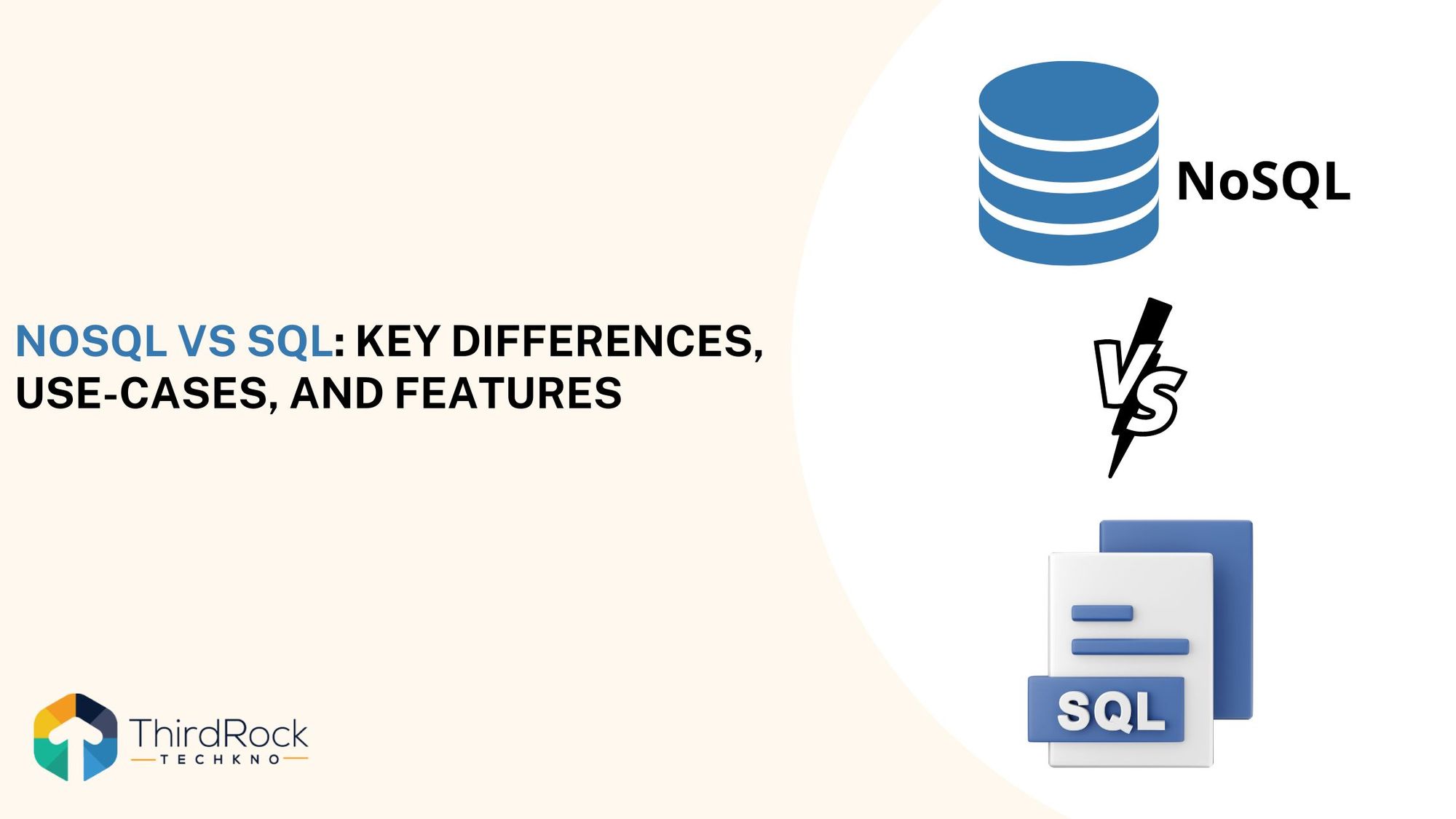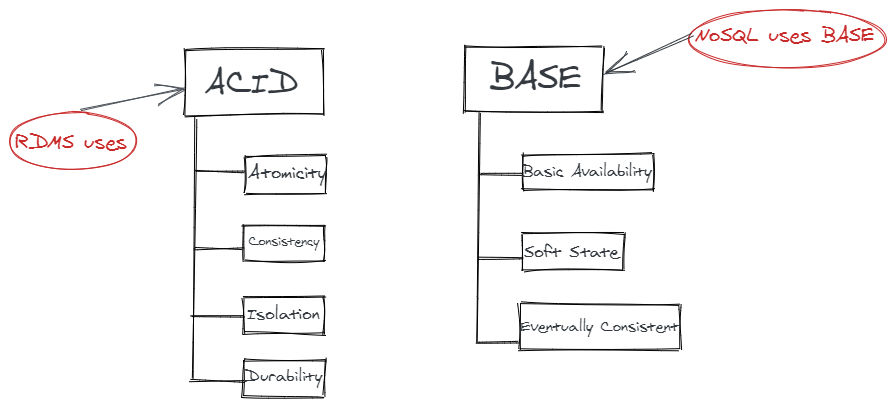Table of Contents

Data is the lifeblood of any organization. It's an essential element, given its role in making informed decisions and affecting business processes. This can range from connecting with customers through marketing analytics to product development and sales forecasting.
Introduction
The importance of proper database management cannot be understated.
These days, it's not unusual to find that databases are used to store almost everything: from medical data, financial information and records, shopping carts, your favorite songs on Spotify, and so on. But when it comes to choosing a database technology for your next project, you'll have to know where you stand.
That's why we thought it would be interesting to compare NoSQL vs SQL to give you an overview of each.

What is SQL? - A Quick Overview
SQL ( Structured Query Language) is a language that allows you to access and manage databases. A relational database is, essentially speaking, a collection of information in which data can be linked together through relationships.
Relational databases store and retrieve data using tables, which are defined using rows and columns. With tables, different fields can be associated with each other in order to perform various tasks such as sorting, filtering, and grouping. SQL is a programming language used with these relational databases; however, it only understands one thing - tables.
Ingres, Microsoft Access, Microsoft SQL Server, MySQL, Oracle Database, and PostgreSQL.
GIF source: Wired
Features of SQL
✅Relational Foundation
✅Vendor Independence
✅Highly scalable
✅Easy to learn
What is NoSQL? - A Quick Overview
NoSQL stands for Non-Relational It’s used to describe databases and database systems that don’t use SQL technology. As opposed to traditional RDBMS (Relational Database Management Systems), these databases don’t have a fixed schema. And they don’t necessarily enforce relations between tables.
NoSQL is a collection of technologies that describes a type of datastore that does not conform to relational databases. This means that instead of using tables or relationships to store data, NoSQL databases store it in JSON documents.
A few examples of SQL database management systems include Amazon Dynamo DB, Apache Cassandra, Bigtable, CloudDB, Couchbase, MarkLogic, and MongoDB.
Source: Medium
Features of NoSQL
✅Flexible schemas
✅Horizontal scaling
✅Fast queries due to the data model
✅Large amounts of data & higher user loads
Is NoSQL a Database?
A lot of the controversy around NoSQL databases comes down to semantics. Some people use the term to refer only to those systems that do not use relational databases. Other people use it to refer to any alternative database format. However that may be, most people agree that NoSQL databases are databases that store data in a format except for relational tables.
NoSQL databases, also known as, “not only SQL" is a new class of databases that store and manage data in different ways than traditional relational databases. Unlike a relational database, which has tables and columns to hold data, NoSQL is built on top of other key principles: it's non-tabular and stores data differently than standard relational databases.
But despite this basic difference, NoSQL still falls into the category of database because it uses tables to store information similar to what relational databases do.
NoSQL vs SQL - Key Differences

Choosing a database is a big decision and one that can often take some time to investigate. While both the relational SQL database and NoSQL database models are capable of offering a unique set of benefits, there are several key differences that clients should examine before deciding. So here it is, SQL and NoSQL differences, let’s get to it without any further ado.
1.Structure
🟩SQL:
SQL uses a fixed or rigid database schema in a relational and tabular form. Its databases are structured in terms of rows and columns. Most often than not SQL databases can be viewed as too restrictive and inflexible in certain circumstances.
🟨NoSQL:
Unlike SQL, NoSQL databases have a dynamic or flexible database schema in terms of structure and data model. It uses documents, key-value, wide-column, and graph databases. They do not have explicit tables or columns to define data relationships.
2. Scalability
🟩SQL:
SQL databases are vertically scalable which is why they are known to have high performance in terms of scalability. They can easily be vertically partitioned (each partition will have a cluster of its own), therefore adding more processing power to the underlying database.
🟨NoSQL:
NoSQL databases are horizontally scalable and handle lots of data with ease. Increasing the number of servers to share some load is one way to make your database scalable. This is known as horizontal scaling and it's a common pattern in NoSQL databases.

3. Language
🟩SQL:
SQL is compatible with most database systems. Even the syntax or grammar of SQL is very similar to other languages which is why you can write complex queries which are easy to grasp and understand. However, there are some restrictions on what can be written in a query. Hence it's best to understand the fundamentals of SQL before you begin.
🟨NoSQL:
NoSQL database languages are dynamic, meaning they're constantly being updated as new functionality is added or changed. As a group, NoSQL languages lack the ability to use the same syntax both when writing their own queries and when making queries against other systems. This can make it difficult for NoSQL databases to handle complex queries.
4.Community and support
🟩SQL:
SQL is a long-lived technology that stems back to the 1970s. It boasts of a massive community of experienced developers spread all through the world. Beginners or even intermediate-level programmers can always find a helping hand via online forums and various Q&A sessions.
🟨NoSQL:
NoSQL is a relatively new technology and therefore has a smaller community. It primarily benefits from open systems, such as the Apache Foundation or Google Cloud, that allow for user participation and community building.
5.Properties
🟩SQL:
All SQL databases exhibit ‘'ACID' properties which are Atomicity, Consistency, Isolation, and Durability.
🟨NoSQL:
All NoSQL databases exhibit ‘BASE’ properties namely Consistency, Availability, and Partition Tolerance.

When to use SQL and NoSQL?
NoSQL and SQL are two integral parts of any data organization. But the selection between the two comes down to business goals, technology environments, and the level of complexity that your organization would like to handle. NoSQL vs SQL which to use when? Let’s find out!
Going with SQL is the right move when:
👍Dealing with complex queries
👍Manipulating data
👍Performing calculations
👍Involvement of big data
👍Consistency is important
Use cases for SQL - developing custom dashboards, inventory management, payroll, customer data managing e-commerce applications, etc.
Going with NoSQL is the right move when:
👍There is large volumes of data
👍ACID properties aren’t required
👍Businesses are growing rapidly
👍High transaction rate
👍Real-time query responses
Use cases for SQL - social media platforms, web analytics tools, web applications, mobile applications.

Why use NoSQL over SQL?
Since the inception of cloud computing, there has been a shift in the way we manage and use data – from traditional relational databases to NoSQL databases. These new emerging databases allow you to save time by eliminating complex data storage procedures and costly bandwidth management schema that would be necessary with a traditional database structure.
NoSQL databases are the latest trend in data management. They’re easy to use, fast, scalable, and offer fewer limitations than SQL databases. The most common misconception about NoSQL is that it offers a complete replacement for relational databases. But this isn't entirely true.
While SQL is still a popular database standard, one cannot overlook the rise of NoSQL. What’s the reason you ask? It’s quite simple. The rising volumes of unstructured data, changing storage required, and the need for speedy processing power are just a few causes that have contributed to the change.
Wrapping Up
When it comes to choosing a SQL or NoSQL database, the answer will be determined by how an application will be used. As long as an organization understands the needs of its application, the right DBMS choice can be made.
The key is to research requirements and expected solutions before making a choice, and if one organization already uses another DBMS, then it is wise to consider other factors before changing.
Hopefully, this article helped you understand what primary applications each of these two database platforms are ideally suited for.
Have a project to discuss or need help with making the right decisions for your business? Count on Third Rock Techkno to help you with your most daring projects and navigate the most difficult tasks.

